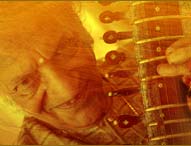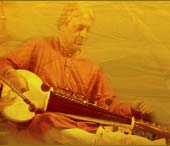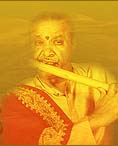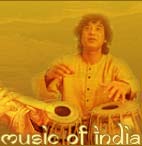Born On: March 21, 1916
Born In: Dumraon, Bihar
Died On: August 21, 2006
Career: Indian Classical Musician and Shehnai Maestro
Nationality: Indian
Where shehnai was just another instrument confined to temples and marriages only, he came up and popularized it as a famous classical instrument in concert halls. The instrument was brought to center stage Indian music with his undying efforts and interest in music and the shehnai. He and shehnai are synonymous and inseparable. Credited with having almost monopoly over the shehnai, Ustad Bismillah Khan was one of the finest and distinguished musicians in India after the partition. Furthermore, by respecting deities from other religions, though being an ardent Shi'te Muslim, he set an example of Hindu-Muslim unity in India. He was the third musician to receive the highest civilian honor, the Bharat Ratna, after Pandit Ravi Shankar and MS Subbulakshmi.
Early Life
Ustad Bismillah Khan was born as Qamaruddin Khan in Bhirung Raut ki Gali at Dumraon, Bihar. He was born as the second son of Paigambar Khan and Mitthan. He hailed from the family of musicians, wherein his ancestors were musicians in the court of princely states of Bhojpur, now in Bihar. His father was a shehnai player in the court of Maharaja Keshav Prasad Singh, Dumraon. His named was changed to Bismillah by his grandfather Rasool Baksh Khan. On being relocated to Varanasi at his maternal uncle at the age of 6, Bismillah received formal training in music from him, Ali Baksh 'Vilayatu', a renowned shehnai player at Vishwanath Temple, Varanasi.
Career
Bismillah Khan practiced the shehnai devotedly and perfected in a short span of time. It was his concert in All India Music Conference in Calcutta in 1937 which brought shehnai into the limelight. It was highly appreciated by the common masses and shehnai became associated with Bismillah. His live performance at Delhi's Red Fort became an inseparable part of the celebration of the first Independence Day in 1947, when he was invited by the first Indian Prime Minister Jawaharlal Nehru. Later on January 26, 1950, he even performed at, yet again, Red Fort on the eve of India's first Republic Day. His recital was telecast on Doordarshan every year as part of cultural activities in Independence Day celebrations. He performed almost at every place across the globe. He took active participation in the Cannes Art Festival and Osaka Trade Fair. Continuing his musical presence, he was invited in the World Exposition in Montreal. The modesty and simplicity of Bismillah Khan was reflected in his lifestyle. He believed that music has nothing to do with caste and religion. Although he was a dedicated Shi'ite Muslim, he was a staunch devotee of the Hindu goddess of music, Saraswati.
Contribution to Music
Ustad Bismillah Khan will always be remembered for his remarkable contribution to the Indian music. He is the only one to make the shehnai one of the most popular classical music instruments across the world. He was the perfect and unbeatable synonym for shehnai.
Association with Movies
While keeping the magic of shehnai alive round the world, Bismillah tried his hand at some movies as well. He played the shehnai for Kannada film 'Sanaadi Appanna' and had even acted in the Satyajit Ray movie 'Jasaghar'. The sound of shehnai in the 1959 film 'Goonj Uthi Shehnai' was provided by this music legend. He recorded for his last movie in 2006 in 'Swades' for the song 'Yeh Jo Des Hai Tera'.
Death
Ustad Bismillah Khan was admitted to Heritage Hospital on August 17, 2006 and four days later, died of a cardiac arrest on August 21. A day of national mourning was announced by the Government of India on his death. He was buried, along with a Shehnai, at Fatermain burial ground, Old Varanasi with a 21-gun salute from the Indian Army. He is survived by five sons, three daughters, and several grandchildren and great-grandchildren.
Legacy
'Ustad Bismillah Khan Yuva Puraskar' was instituted by Sangeet Natak Akademi, New Delhi in 2007 as a tribute to Ustad Bismillah Khan. This award is honored to young artists excelling in the fields of classical music, dance, and theater.
Awards & Recognition
Best Performer in All India Music Conference, Allahabad, 1930
Three medals in All India Music Conference, Calcutta, 1937
Tansen Award, Govt. of Madhya Pradesh
Sangeet Natak Akademi Award, 1956
Padma Shri Award, 1961
Padma Bhushan Award, 1968
Padma Vibhushan Award, 1980
Talar Mausiquee from Republic of Iran, 1992
Fellowship of Sangeet Natak Akademi, 1994
Bharat Ratna Award, 2001
Honorary doctorate from Banaras Hindu University, Varanasi
Honorary doctorate from Visva Bharati University, Santiniketan
Timeline
1916: Born on March 21 in Dumraon, Bihar
1956: Bagged the Sangeet Natak Akademi Award
1961: Received Padma Shri Award
1968: Honored with Padma Bhushan Award
1980: Conferred upon with Padma Vibhushan Award
2001: Bestowed with Bharat Ratna Award
2006: Died of a cariac arrest on August 21 in Varanasi.






